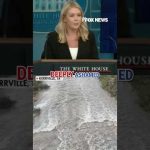In a rather dramatic turn of events, recent natural disasters have sparked a fiery debate about government actions and responsibilities. The conversation centers around the National Weather Service (NWS) and the effectiveness of weather forecasting in crises. Some voices claim that the fiasco stems from the Trump administration’s cuts to weather forecasting capabilities. These accusations seem part of a larger trend where politicians are eager to place blame on previous administrations without fully understanding or acknowledging the complexities involved in responding to natural disasters.
Many believe the heavy criticism of the Trump administration for making “deep cuts” to weather forecasting services is unjustified. The NWS has reportedly provided consistent early warnings and alerts regarding severe weather conditions. Yet, for some, the issues are being politicized, with an urgency to connect these tragedies to partisan failures. As families grapple with loss during disasters, tying such events to political missteps may complicate necessary discussions about preparedness and response.
The situation becomes even murkier when discussing understaffing in local weather offices, which a few critics have pointed to as a significant factor in the disastrous outcomes of recent floods. However, dismissing the performance of the NWS outright ignores the effective alerts and sustained monitoring they provided. This begs the question: Is it productive to rush to assign blame before a complete understanding of the facts is established?
Moreover, the ongoing argument about climate change often dominates discussions about natural disasters. Some individuals simply seem to use such events to promote their agendas. The perception that weather patterns are being politicized can lead to distractions instead of focusing on how to improve current warning systems and disaster preparedness. Many participants in these debates seem more preoccupied with points-scoring in the political arena than finding solutions that benefit communities in crisis.
In the end, families affected by tragedy require healing and support, not political games. It is essential to steer conversations towards building better collaborations between local and federal response efforts. The continuous push to utilize weather disasters as a political football does not help anyone, especially those still searching for closure after catastrophic events. Instead, leaders should work together to establish systems that better serve communities in need while ensuring that accountability remains for those responsible for managing public safety and emergency response.




